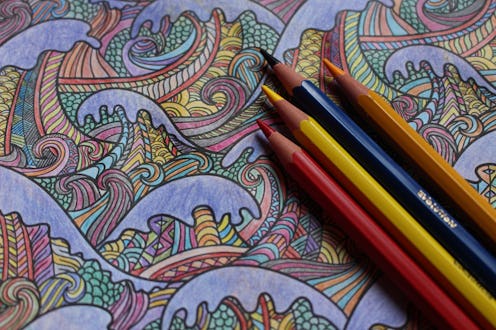
Coloring books for adults have become the latest trend, and unlike some fads, this one is actually really good for you. According to clinical psychologist Ben Michaelis, coloring is a stress-free activity that relaxes the amygdala — the fear center of the brain — and allows your mind to get the rest it needs. But coloring has other indirect health benefits, as well.
Even if it didn't make us healthier, many of us would still probably be coloring as adults. It's true, of course, that the inherent fun of coloring might be linked to its de-stressing properties, but I think the activity's helpful qualities are really just an added bonus. At the end of the day, coloring is good for you because it's fundamentally fun.
If you haven't yet found a way to legitimize the cost of adult coloring books and art supplies, this article is for you. Here you'll find all the benefits of coloring, both direct and indirect. Hopefully, these seven reasons will convince you to take up some colored pencils or crayons and get to work, so you can find out all about that pleasure for yourself.
1. Psychiatrists Have Prescribed Coloring To Patients For 100 Years
The famed psychologist Carl Jung was on to something when he started prescribing coloring to his psychiatry patients. He gave his clients mandalas to color as part of their therapy, and you can still purchase mandala coloring books today. But no matter what you choose to color, you'll be right in line with Jung's therapeutic model, because ...
Adult Coloring Books, $9,Amazon
2. Coloring Gives You A Chance To Be Social
As coloring books become an increasingly popular hobby for adults, this usually-solo activity has also turned into a social one. Coloring parties — in which adults gather to sip wine and socialize while coloring — have become a thing. Artist Lisa Congdon theorizes about the social aspects of coloring, saying, "I think for women who don't know how to draw or don't feel comfortable or confident drawing, this is another way to socialize and have an activity that they can do with other people … and because you don't need to concentrate very much when you're coloring in a coloring book, you can talk and have glass of wine."
You can even use coloring events to bond with your co-workers. Instead of weekly happy hours, try organizing a coloring party instead. It's fun, stress-free, and there's very little chance that anyone will want to stab someone else with a colored pencil.
3. Coloring Reduces Stress And Anxiety
Coloring allows the fear center of your brain to relax, thereby relaxing you — and not just while you are coloring. Giving your amygdala periodic rests actually reduces your stress overall. Coloring is a meditative, free-time activity you can schedule, making it perfect for retraining your amygdala to respond less harshly to stress.
4. Coloring Trains Your Brain To Focus
Staying inside the lines takes focus, but not so much that it's stressful. Clinical counselor Leslie Marshall notes that the activity "opens up the frontal lobe of the brain — the home of organizing and problem solving — and focuses the mind" by allowing colorers to forget their worries. Being able to live in the moment is a critical skill in our increasingly demanding world, and coloring trains you to put everything else aside for the hour you spend doing it.
5. Coloring Lets You Be You
Your coloring book is your coloring book. It doesn't matter what anyone else thinks of it. You don't have to show it to anyone else if you don't want to. No one has to know that you accidentally colored that cat's leg green because you thought it was part of the ground and that's why it's a black cat now, OK? If you want to see a blue duck, well, that's OK, too. This is your time, sweetums, so color however you want.
6. Coloring Helps Your Fine Motor Skills And Vision
Coloring requires the two hemispheres of your brain to communicate, and the activity itself improves your fine motor skills and vision. The "action involves both logic, by which we color forms, and creativity, when mixing and matching colors," psychologist Gloria Martínez Ayala says. In turn, this "incorporates the areas of the cerebral cortex involved in vision and fine motor skills." Coloring books, much like crossword puzzles, are therapeutic and may delay or prevent the onset of dementia in older individuals.
7. Coloring Is Free Decoration
DIY is all the rage these days, but not everyone has time to make their own soaps and ceramics and candles. Sometimes, even spray paint is too much trouble. Once you've filled up your 65-page coloring book, though, you can use it for all sorts of easy crafts, from wall decor to decoupage. So seriously, why aren't you coloring yet?
Images: Lisa Congdon/Flickr; Giphy (8)